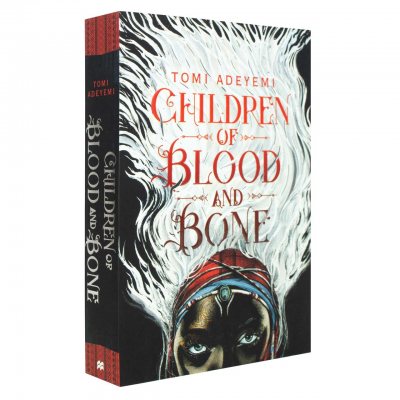Introduction
Is it equitable to treat someone poorly because they are different? In the book Children Of Blood And Bone by Tomi Adeyemi, a challenging setting is the world of Orisha. The challenging world of Orisha helps the reader understand the loss of language, paying a tax because your different, and water scarcity.
Body 1
In chapter 1 we see how the maji are forbidden to speak their language. "Fool, she scolds me in Yoruba, the maji tongue outlawed after the Raid. I haven’t heard our language in so long, it takes me a few moments to remember what the word even means". King Saran of Orisha hates the maji people because they killed his family and thinks every maji is out to get him. Therefore, he is getting vengeance by restraining the maji from speaking their mother tongue. This statement shows that King Saran had an influence on the maji people. He tried to clear their language off completely, so it would be difficult for the current and next generation to use it against him. This could be compared to the real world when the Maori people of New Zealand were also forbidden from speaking their language by the Europeans. King Saran stereotypes every maji by thinking they are dangerous and they want to kill him because of one Maji's misdoing. I think that's wrong and you shouldn't be judged by the misdeed of others. Labels are for clothing, not people!
Body 2
In chapter 2 we see how the maji people are forced to pay unfair taxes because they are different from the kosidan. “It’s a diviner tax.” I grip the draped fabric of my pants, still haunted by the guard’s touch". King Saran truly despises the maji because of their magic. He forces them to pay a diviner tax, a tax because they're different. Guards of Orisha approach every diviner house and demand for money. The taxes are very high. So this makes it very difficult for the diviners to pay for their basic necessities, such as food. King Saran does anything to make the maji people vulnerable and defenceless. This could be compared to racism when people treat others who are different from them in an unfair way and make them feel bad about themselves. You shouldn't have to pay because you're different, I think that's unfair. Instead, we should embrace diversity and just be more empathic.
Body 3
In chapter 23 we see how water is misused as entertainment. “How is this possible?” I hiss under my breath, remembering the labourers no more than skin and bone. “So many dying for water and they waste it on this?". The arena is a colosseum which several boats fight to the death, with one victorious. They use the water in this situation for the boats to float. In this chapter labourers in the city of Ibeji are forced to work in tough conditions while water in their city is "scarce". When in reality the city has enough water for the labourers but choose to use it on entertainment for the privileged. This could be compared to the hunger games when the rich pay to watch the poor fight for their lives, with one victorious. I think as humans, we shouldn't waste water, and be more humane about these issues.
Conclusion
In Children Of Blood And Bone, we see that the challenging setting of Orisha has many flaws. From the unfair taxes towards the maji, or the wasting of water in Ibeji or even loss of language amongst all diviners. The setting of Orisha helped understand these ideas. “They don't hate you, my child. They hate what you were meant to become.”
😊 Thanks For Reading 😊

Fantastic writing, Nidhi! Your essay is organized and thoughtful. Your introduction lets the reader know what the essay will be about. Your paragraphs go into detail with quotes and your own links and thoughts.
ReplyDeleteKeep it up!